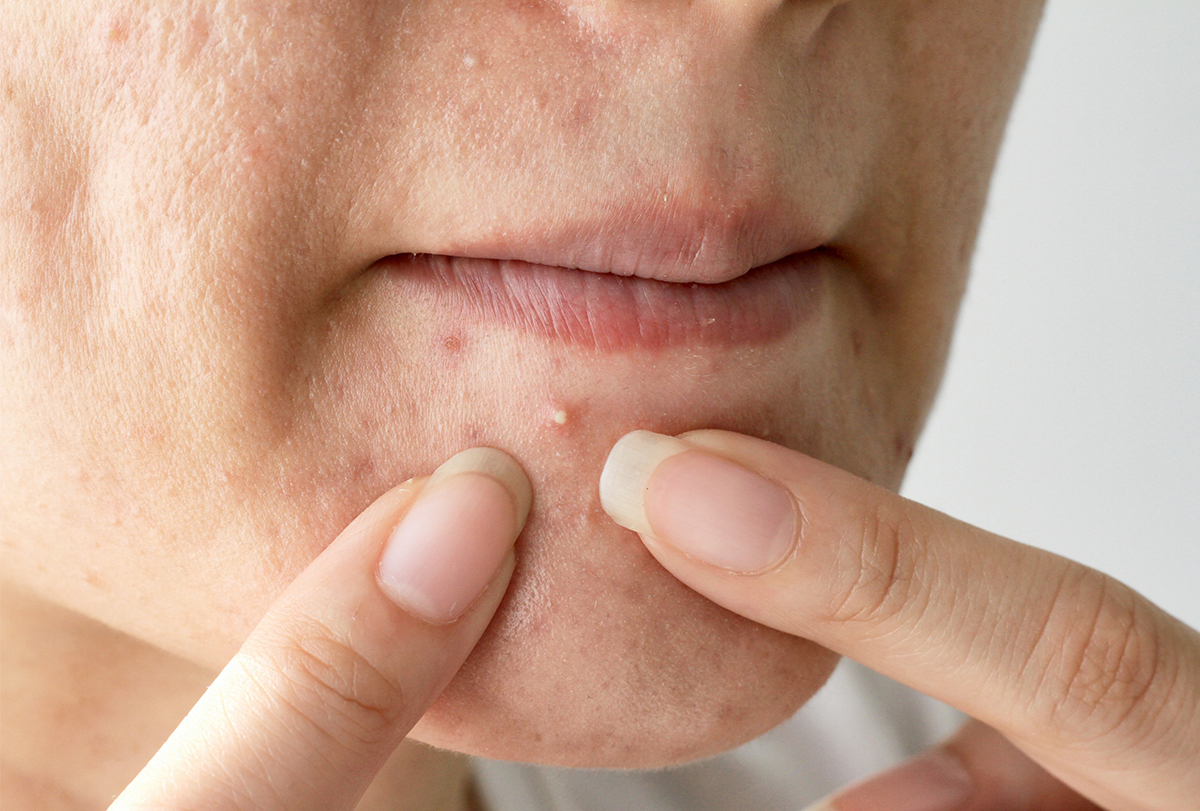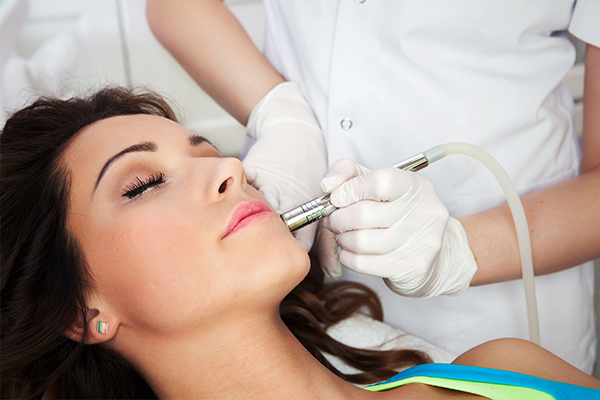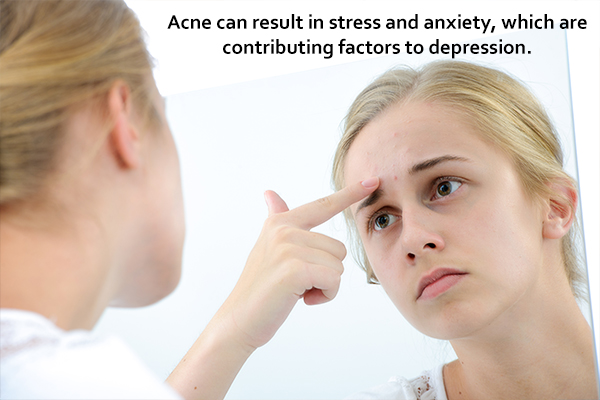In this article:
The appearance of spots on the skin, especially in the face, is medically known as acne. Acne has various types, with the most common one being acne vulgaris.

Acne is commonly referred to as spots, zits, or pimples. It is highly prevalent among adolescents; however, the condition may persist and become severe in adulthood.
This article talks about the various types and causes of acne and the available treatment methods.
How Common Is Acne?
Acne vulgaris is the eighth most common skin disease, with an estimated global prevalence of 9.38%, according to the Global Burden of Disease Study. It is found to affect around 8.96% of males and 9.81% of females at one point. (1)
The prevalence of acne varies among different countries and age groups, ranging from 35% to 100%. (1)
Types of Acne

Acne can be classified into the following types:
1. Non-inflammatory lesions/comedones
These types of acne are formed due to excessive sebum production, but they do not involve the growth of bacteria.
- Whiteheads result from bulging of the skin due to a closed, clogged pore.
- Blackheads forms as a result of an open clogged pore and darkening of the top surface. It is generally assumed that they are caused by the accumulation of dirt on the skin. However, they are a result of the reaction of oxygen with the buildup inside the pore.
2. Inflammatory lesions
Inflammatory lesions develop from an immune reaction against bacteria present in the clogged pores. These can be further divided into three types:
- Papules are small, tender, red pimples.
- Pustules are white or yellow and are filled with pus.
- Nodules and cysts refer to an aggregation of many pustules that cause pain.
Acne is graded according to severity into:
- Mild acne: Characterized by the formation of no more than 30 lesions, mostly comedones
- Moderate acne: Characterized by the formation of up to 80 lesions, consisting of a mix of papules, pustules, and comedones
- Severe acne: Characterized by the formation of 120 or more, mostly inflammatory, lesions
Cause of Acne
Generally, acne results from an overproduction of oil in the skin. The skin contains sebaceous glands in the hair follicles, which are responsible for oil or sebum production.
With age, hormones stimulate the production of sebum, which may accumulate in the pores along with dead skin cells, resulting in clogged pores.
Clogging of pores enables the growth of anaerobic bacteria such as Propionibacterium acnes. These microbes initiate an inflammatory reaction in the skin, resulting in the formation of a comedone in the follicle. (2)
Medical Treatment for Acne

Acne treatment depends on the type and severity of acne. (3)
For mild acne
Mild acne can generally be treated with over-the-counter creams and lotions that contain:
- Benzoyl peroxide to reduce oil production and also to prevent inflammatory acne
- Resorcinol, salicylic acid, and sulfur to induce the breakdown of whiteheads and blackheads
- Topical retinoids to reduce comedone production and prevent flare-ups
Use these medications as prescribed by your doctor. In general, it is advised to:
- Apply the medication every other day to get your skin used to it.
- Wash your face 10–15 minutes after application.
Note: If the medication causes dryness and irritation or fails to clear your acne after 6–8 weeks of use, consult your doctor for a change in treatment.
For mild to moderate acne
Mild to moderate acne requires the following treatment modalities:
- Combination therapy: This involves the use of topical retinoids and topical antibiotics for both non-inflammatory and inflammatory lesions.
- The commonly used antibiotics for inflammatory acne are clindamycin and erythromycin. The latter is preferred for children as tetracyclines can interfere with teeth and cartilage growth. (3)
- Pregnant women are often prescribed azelaic acid as it has both antimicrobial and anticomedonal effects.
For moderate to severe acne
Moderate to severe acne can cause pain and leave scars and require these interventions:
- Prescription topical medications along with oral antibiotics such as tetracycline and erythromycin may be used.
- Benzoyl peroxide may be prescribed to prevent bacterial resistance from oral antibiotics.
- Acne is common in women due to hormonal changes, commonly PCOD. Therefore, hormonal therapy using estrogen-containing oral contraceptives may be helpful.
- Isotretinoin, an oral vitamin A derivative, can also be used for severe acne. However, it should only be used as a last treatment resort as it has various side effects.
- For pregnant women, it is best to avoid anti-androgens, isotretinoin, and tetracyclines. Instead, erythromycin may be used. (3)
For severe acne
Along with general medications, severe acne may require additional treatment, including:
- A corticosteroid injection: Corticosteroids help lower the pain associated with severe acne and reduce the breakout. (4)
- Laser or light therapy: Laser therapy, along with general acne treatment, can be effective for severe acne. (5) However, more evidence is needed to validate the use of laser therapies in acne. (6)
Additional treatments
The following procedures may help with acne treatment. However, they are not extensively studied for the same.
- Comedone extraction can help reduce the number of non-inflammatory, treatment-resistant comedones. (7)
- Microdermabrasion is used to remove dead skin cells and can help reduce acne scars. (8)
- Chemical peel is generally helpful in removing the layer of dead skin cells, thus inducing growth of fresh, healthy skin cells. (8)
Diagnosing Acne
Acne can be diagnosed through a physical examination of your irritated skin. Furthermore, the doctor may ask about your medical history, age, and lifestyle to help determine the cause and severity of acne.
It is important to consult a doctor as you may mistake perioral dermatitis or hidradenitis suppurativa as acne. (9)
Risk Factors for Acne
Various factors can trigger acne flare-ups. These include:
- Medications such as anabolic steroids, corticosteroids, and contraceptives (10)
- Cosmetics and emollients
- Medical conditions such as Cushing’s disease or syndrome, polycystic ovary syndrome, and congenital adrenal hyperplasia (11)
- Hormonal changes, generally during puberty, menstruation, pregnancy, and menopause (11)
- Stress (12)
- Picking existing pimples
- Excessive washing of face
- Foods such as breads, rice, and sugary drinks (13)
- Pressure from tight equipment such as helmets, collars, backpacks, and uniforms
- Irritants such as high humidity and pollution
- Family history (hereditary)
Psychological Implications of Acne

It is common for people to be bothered by acne formation on their face, often causing: (14)
- Depression: Acne can result in stress and anxiety, which are contributing factors to depression.
- Social withdrawal: The development of acne can lower self-esteem and cause poor body image, fearing judgment from others, often resulting in the decision of social withdrawal.
When to See a Doctor
It is recommended to consult your doctor if:
- Your acne is causing emotional stress.
- You have severe, painful acne.
- Your acne is causing permanent scars.
- Your acne has worsened after treatment.
Final Word
Acne is a common skin condition affecting the face, neck, upper arm, and upper trunk. Acne forms due to the accumulation of oil and dead skin cells, which clog skin pores.
While not a threatening condition, severe forms of acne can cause permanent scarring and can affect your self-esteem. Consult a dermatologist for treatment and management of your acne.

- Was this article helpful?
- YES, THANKS!NOT REALLY


